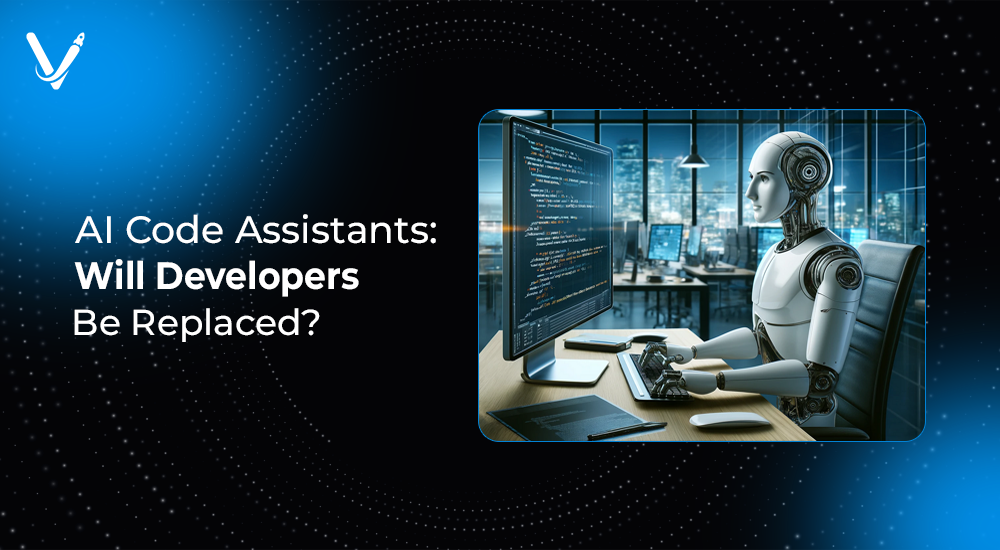AI Code Assistants: Will Developers Be Replaced?


- Jun 22, 2025
You’ve probably seen the headlines. “AI writes code faster than humans.” “GPT-4 solves coding interviews.” “AI tools eliminate the need for programmers.” It’s a thrilling yet unsettling time to be a developer. With AI-powered code assistants like GitHub Copilot, Amazon CodeWhisperer, and ChatGPT redefining software development workflows, many are left wondering: Will developers still have jobs in the future?
This article explores that question with clarity and nuance. Instead of fueling fear or blind optimism, we’ll examine how AI code assistants are reshaping the software landscape, where they shine, where they fall short, and why human developers remain essential to the future of tech. We’ll cover real-world use cases, ethical dilemmas, and what developers can do to stay relevant in an AI-assisted world.
AI code assistants are software tools that use machine learning—especially large language models (LLMs)—to help developers write, review, and understand code. They can autocomplete functions, suggest bug fixes, write documentation, and even generate entire codebases based on natural language instructions.
Popular examples include:
These tools are not mere auto-complete engines. They analyze vast amounts of code, learn syntactic patterns, and generate context-aware suggestions, making them powerful development companions.
The anxiety isn’t unfounded. AI tools are getting smarter and more capable every month. If AI can generate clean, functioning code within seconds, it raises valid concerns:
The rise of no-code and low-code platforms only adds fuel to the fire, suggesting that business teams could build apps without relying on traditional developers.
But let’s pause and ask the more important question—not just "Can AI replace developers?" but "Should it?" And what would that mean for software quality, ethics, and innovation?
To understand the future, we must first understand the present. Today’s AI code assistants are capable of:
Tools like GitHub Copilot can complete entire lines or blocks of code based on what you’re typing. They also generate boilerplate code like class definitions, test suites, and repetitive functions.
LLMs allow developers to describe problems in English and receive code suggestions instantly. For example, “write a Python function that checks if a number is prime” yields accurate results most of the time.
AI assistants can translate code from one language to another (e.g., Java to Python), which is helpful for migration or learning new stacks.
AI can identify potential bugs or syntax errors and suggest improvements. Some tools even offer inline explanations for why a line might be problematic.
Some assistants can generate descriptive comments or entire README files, making codebases more understandable and well-documented.
While impressive, these tools are far from perfect. They still have limitations that highlight the ongoing need for human oversight.
AI lacks deep understanding of complex business logic, architectural decisions, or multi-module codebases. It can generate syntactically correct code that breaks the moment it's tested against real requirements.
AI often suggests code that is insecure or doesn’t comply with data protection laws. For instance, it might recommend storing user passwords in plain text if it has seen that pattern in its training data.
AI-generated code may introduce shortcuts that work in the short term but lead to long-term maintenance headaches.
GitHub Copilot has faced legal scrutiny over generating code snippets that resemble open-source projects with restrictive licenses. Developers must ensure that AI suggestions don’t violate usage terms or plagiarize proprietary content.
Rather than viewing AI as a replacement, it’s more accurate to see it as a force multiplier. Developers who understand how to use AI tools gain speed, reduce grunt work, and improve accuracy—but they still provide critical thinking, creativity, and judgment that AI cannot replicate.
Why human developers remain irreplaceable:
AI doesn’t understand “why.” It excels at “what.” Developers bridge that gap with intent and insight.
Shopify integrated Copilot into their developer workflow and reported significant boosts in developer velocity. Developers found Copilot most useful for writing tests and exploring unfamiliar codebases.
Replit’s Ghostwriter helped thousands of students debug, structure, and learn Python and JavaScript. While it accelerated learning, instructors had to redesign assignments to avoid over-reliance on AI.
CodeWhisperer excels in suggesting code snippets for AWS services like S3, Lambda, and DynamoDB. But it requires developers to verify configurations and optimize performance—a reminder that AI still needs supervision.
One of the biggest concerns is that AI tools might eliminate entry-level programming jobs. After all, if AI can write simple CRUD applications or basic Python scripts, why hire junior devs?
Here’s the reality:
If anything, AI raises the bar for what juniors need to know: not just syntax, but architecture, testing, ethics, and adaptability.
Rather than erasing careers, AI is shifting developer responsibilities. These roles will gain prominence:
Developers who master prompt engineering and tool configuration will deliver faster, higher-quality software using AI copilots.
As AI code assistants become more embedded, new roles will emerge to review the safety, fairness, and legal compliance of AI-generated code.
AI will help solo devs or small teams build full-stack products quickly. Knowing how to glue together frontends, backends, and APIs will be more valuable than ever.
AI will accelerate testing, deployment, and observability. Engineers who can orchestrate pipelines and cloud infrastructure will see growing demand.
Here’s how to future-proof your skills and thrive alongside AI:
Looking ahead, AI won’t eliminate developers—it will redefine them. Programming may become more about engineering logic, human collaboration, and domain expertise, with AI handling the mechanical tasks.
We may see:
Software won’t write itself. It will be co-created—with AI as the apprentice and humans as the architects.
AI code assistants are not a threat to developers—they’re a wake-up call. The days of coding by brute force, rote syntax, and Google searches are giving way to strategic, AI-augmented development.
By mastering how to work with AI instead of against it, developers can level up their speed, creativity, and impact. The future isn’t about replacement—it’s about reinvention.
At Vasundhara Infotech, we help teams build intelligent applications using the latest AI code tools and development best practices. Ready to future-proof your product with AI-enhanced software development? Contact us today to collaborate with our expert engineers.
Copyright © 2026 Vasundhara Infotech. All Rights Reserved.
